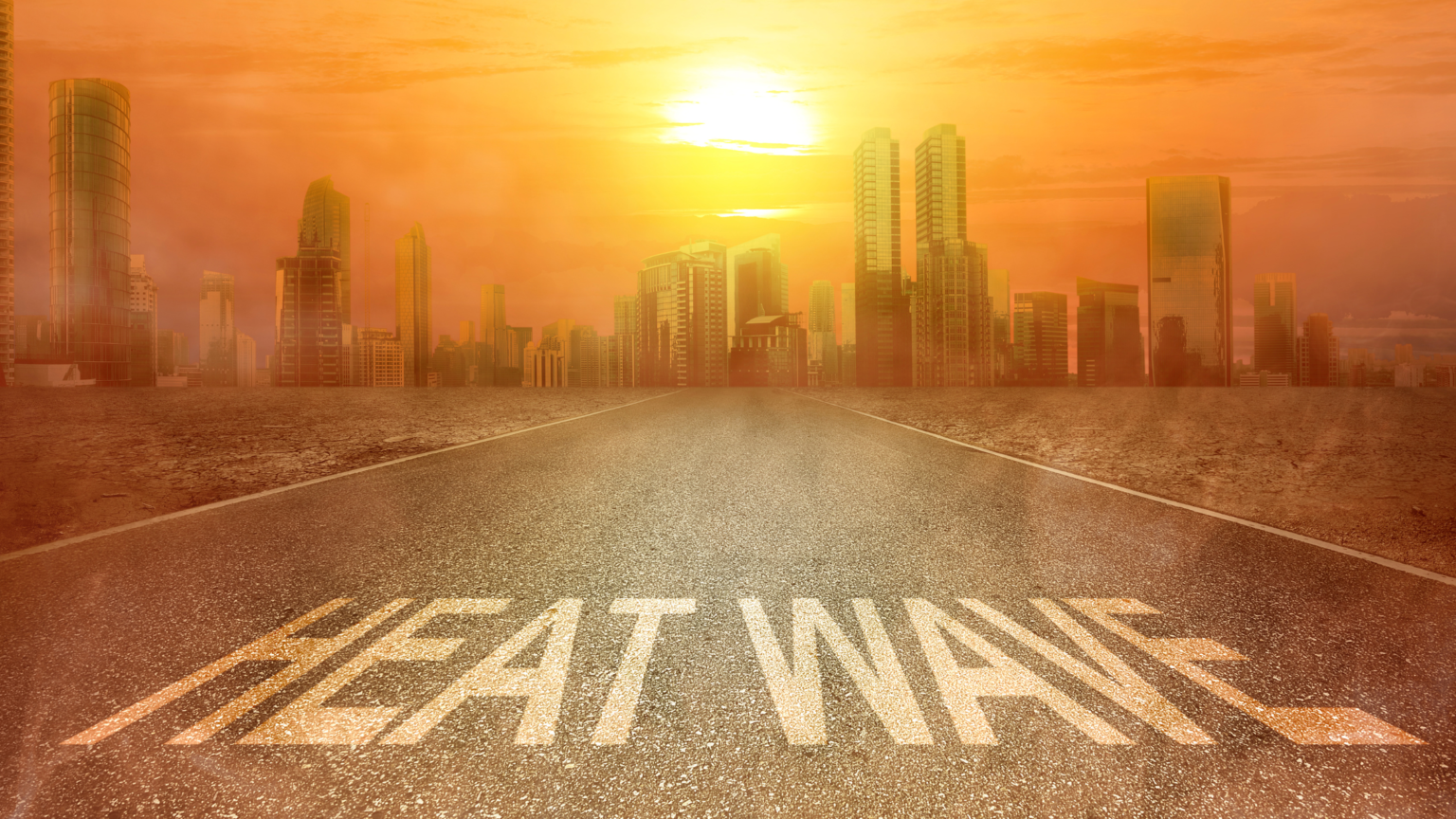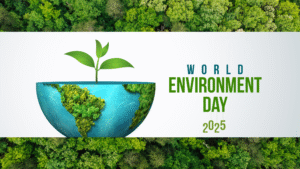What Are Heatwaves?
Concept, Causes & Impact
A heat wave is a sustained period of unusually hot weather, often accompanied by high humidity. Most definitions generally state it involves a period of several days or more of abnormally hot weather that causes significant health problems, but no universal warning threshold has been established.
When a high-pressure system stalls over a region and traps warm air underneath it, causes heatwaves. Climate Change is one of the biggest known causes.
This phenomenon, sometimes also called a “heat dome,” can bring long stretches of high temperatures. Higher global temperatures due to climate change have also led to a rise in both the frequency and intensity of heatwaves, according to Treehugger.
Heatwaves can seriously affect infrastructure, agriculture, and public health. Heatwaves are the deadliest weather-related phenomenon in the US, killing more people each year than hurricanes, floods, and tornadoes combined, as per the National Oceanic and Atmospheric Administration (NOAA).
Regions Most Affected in the U.S.
Overview of Affected Areas
This heatwave has affected many areas in the United States but the Southwest and parts of the Midwest have been getting heavily hit. Cities are seeing temperatures soar above 110°F (43°C) such as Phoenix, Las Vegas and Dallas.
Heat advisories and extreme heat warnings have been issued for the southern Central Valley of California and portions of southern California, which also extend into parts of southern New Mexico, Utah, and Colorado.
Those numbers will, more than likely, increase the risk of heat-related illnesses in general, especially with highs expected to be in the 90s every day this week. Particularly, the temperature amid heatwave Chicago broke a record for Monday.

Impact on Urban vs. Rural Areas
Urban areas suffer specifically from elevated temperatures during events due to the “urban heat island” effect where concrete, buildings and tarmac absorbs heat during the day. Therefore, the roads, buildings and other infrastructure absorb heat during the day and store it for hours before slowly releasing it during the night to prevent urban areas from getting cooler.
High energy consumption, car emissions, and sparse vegetation in cities, all contribute to rising evening temperatures and prolonged heat waves, worsening the heatwave effect.
Rural areas, despite having more vegetation and open spaces, can also experience very high temperatures, especially when the heat lasts for an extended period. More efficient cooling at night and improved air circulation also take place due to the absence of dense infrastructure.
However, there remain a few associated disadvantages to the rural areas. One of these is the difficulty of obtaining air conditioning. The second problem would be the number of healthcare facilities and the third is that emergency response time will be slower. Moreover, heatwaves may also have a negative impact on rural agriculture, since high temperatures can be harmful to crop productivity, livestock, and water.
Consequently, while heatwaves may not be as severe to non-existing in rural location as they are in metropolitan ones, rural areas are still not safe from heatwaves, and protection and readiness for these calamities remain critical there.
Health Risks Associated with Heatwaves
Common Health Issues & Vulnerable Population
During heatwaves, people become vulnerable to heat exhaustion, heatstroke, dehydration as they worsen their chronic diseases. As per the Centers for Disease Control and Prevention, if heat-related conditions are not addressed promptly, they may lead to life-threatening situations.
Foremost, the aged are more prone to heat-related diseases as their body temperatures are slow to cool; however, children are at higher risk too as their bodies have not mastered heat-regulation under high temperatues.
The CDC considers people with preexisting chronic diseases more vulnerable to impacts of heatwaves. Those chronic diseases that are known to lead to such cases include hypertension, heart attack and failure, and type-2 diabetes.
Additionally, as per CDC, people who suffer from mental illness and are under treatment are vulnerable to the grave health implications of heatwaves.
According to the China Health and Nutrition Survey, heatwaves have adverse impacts on mental health in the Chinese population aged 50 and above. Additional heatwave events decrease mental health scores by about 0.027 points. Urban residents, high-income and those with medical insurance groups are less likely to suffer heat, while the low-income, rural, and without medical insurance are more likely to suffer heat. A good dietary preference can reduce the effects.

Recognizing Symptoms and Seeking Help
Physical health can be attributed to ambient temperature and the occurrence of heatwaves. Understanding the symptoms of heat-related illnesses is vital to prompting the necessary response. Symptoms of heat exhaustion include heavy sweating, weakness, dizziness, and nausea. Heatstroke is a more severe condition with symptoms such as confusion, seizures, and loss of consciousness. If heatstroke is suspected, emergency treatment is needed.
Safety Tips for Surviving Extreme Heat
1. Maintain Hydration
The most important thing you can do to avoid heat-related diseases is to stay hydrated. Sweating during heat waves causes the body to lose electrolytes and water, therefore it’s critical to constantly rehydrate. Should you like to maintain your beverages cold all day, think about utilizing insulated water bottles.
2. Make Use of Cooling Products
Cooling cloths reduce body temperature to provide immediate respite from the heat. These towels are perfect for outdoor activities because they are made to keep cool for extended periods of time. They can save lives during periods of extreme heat and are quite simple to operate.
3. Wear Protective Clothing
You can stay cool by dressing in breathable, light-colored clothing that fits loosely on the body. Seek out garments that offer UPF (Ultraviolet Protection Factor) protection for your skin from damaging UV radiation. These particular clothing items are made to provide the highest level of comfort and protection under intense heat.
4. Wear Sunscreen
Sunscreen is necessary to shield your skin from UV rays, which can lead to sunburn and raise your chance of developing skin cancer. Apply a liberal amount of broad-spectrum sunscreen with an SPF of at least 30 before venturing outside. Reapply as necessary, particularly if you’re swimming or perspiring.

5. Use Heatwave Sunglasses
Strong sunshine exposure can harm your eyes and raise your chance of cataract development. It’s essential to wear sunglasses that completely filter UV radiation to protect your eyes. Seek out premium sunglasses made especially to offer the highest level of UV protection.
6. Maintain a Cool Environment
Uplift your comfort level by carrying a portable fan around. Particularly in places without air conditioning, portable fans can offer instant relief from the heat. They are practical for travel and outdoor activities because they are lightweight and easy to carry.
7. Avoid Sun Exposure in Peak Hours
Plan your outdoor activities when it’s cooler outside such as early in the morning or late in the evening. If you are bound to travel outside during peak heat hours, have a rest and seek shady places to take a break while walking. Organizing your schedule during the cooler hours of the day can help you avoid getting sick from the heat.
Help Communities Amid Heatwaves
- During heatwaves, it is especially important to keep an eye on your neighbors, especially the elderly and those with limited mobility. A short visit will help you ensure the well-being and safety of the latter.
- In some hot towns, cooling centers and shelters are set up to provide protection for people. Giving your time or supplies, such as a fan or drinks to this program can be a kind gesture. Such centers might also be very useful to people with insufficient cooling in their homes.
The severe weather sometimes calls for money and volunteers at such organizations, as Red Cross. Your donation will certainly help those whose lives have been heat-struck.
Bottom line
Scientific research has already confirmed that climate change is a direct cause of more frequent and intense periods of extreme heat, and heatwaves are occurring now much more frequently.
Continuously rising temperatures make heatwaves last longer and push the peak temperatures to unprecedented levels.
Moreover, the warming up of the Earth has no other way to manifest itself but to spread these extremes to regions that previously were located in the zone of acceptable temperatures. Thus, the health, economies, and ecosystems of these regions are at risk, and there is an urgent need for a global action.
Since heatwaves are extreme weather events, one must be alert and well-prepared. You can protect yourself and your family from the dangers of severe heat by drinking plenty of water, using cooling products, dressing properly, and staying informed.
Share the suggested tips with friends and family to help them stay safe during heatwaves and urge them to an action. Together, we can make sure everyone is cool and safe.
FAQs
What is a heatwave?
A heatwave is a prolonged period of excessively hot weather, often combined with high humidity. The temperature is greater than the historical average for a particular region during this period. Note that this can be true for the season, month, week, or even day, depending on the specific local climate.
What health risks are related to heatwaves?
Heat waves may cause heat exhaustion, heatstroke, and dehydration and worsen the symptoms of chronic diseases. The high-risk population includes the elderly and young children, but it is not limited to them.
What can I do if the cause of heatstroke is suspected?
Heatstroke is a critical condition requiring immediate medical attention. Once you suspect someone you know has this disorder, it is recommended that you move them to a cooler area and remove any extra clothing. Finally, you should apply cool water to the skin. If the symptoms do not begin to fade away soon, please dial the emergency number.
What can I do to keep cool and safe during a heatwave?
Staying hydrated is crucial in this period. Among other recommendations, the use of cooling products like a towel and a portable fan, lightweight clothing, and sunscreen is effective.
What can I do to help my community in the heatwave?
Sensitive populations need a lot more support and control during the heatwave, so checking on your neighbors, especially the elderly and other vulnerable groups, may help. Additionally, the impact of heat stroke can be reduced with the assistance of the local cooling centers and shelters, to which one may donate or volunteer.
Sources
- https://www.treehugger.com/what-causes-heat-wave-4863232
- https://https://www.noaa.gov/
- https://www.hhs.gov/climate-change-health-equity-environmental-justice
- Zhang, X., Chen, F., & Chen, Z. (2023). Heatwave and mental health. Journal of environmental management, 332, 117385.
- https://www.cdc.gov/niosh/topics/heatstress/










It is perfect time to make a few plans for the long run and it’s time to be happy. I’ve read this post and if I could I wish to counsel you few interesting issues or tips. Perhaps you could write subsequent articles regarding this article. I desire to learn more things about it!